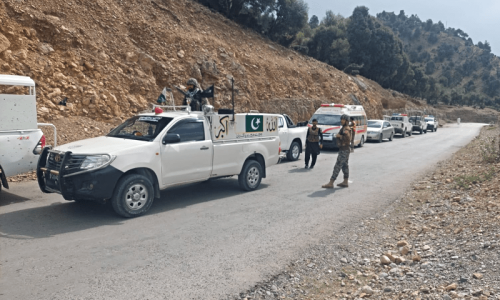NEW YORK: Displaced people from North Waziristan agency have spoken out against Pakistani Taliban's nightmarish hold of their tribal region bordering Afghanistan, saying they destroyed their social structure and traditions.
Some of the tens of thousands of people from Waziristan, who have taken shelter in Bannu following Pakistani military's anti-Taliban operation, told a reporter of The Wall Street Journal (WSJ) that “unbalanced, gun-toting” young militants had let loose a reign of terror in the area, bringing violence and uncertainty to daily life.
During the past decade, according to the dispatch, North Waziristan had become a haven for thousands of Pakistani Taliban, Al Qaeda, Afghan insurgents and militants from across the world, including Europe.
“Everyone feared being kidnapped by the Taliban at any time, said “Zia-ur-Rehman, who ran a pharmacy in Miramshah. “Everyone knew someone who was picked up by the Taliban.”
The non-militant inhabitants of North Waziristan were mostly traders or farmers, and almost all families had kin working as labourers in the oil-rich Gulf countries who send money home, it was pointed out.
They enjoyed a tribal structure that provided relative stability and security. Then the US-led invasion of Afghanistan in 2001 forced elements from the Afghan Taliban and Al Qaeda to take refuge there.
They inspired local tribesmen to form a Pakistani version of the Taliban, originally under a warlord named Nek Mohammad, who was killed in 2004 in the first US drone strike within Pakistan.
By 2007, when Tehreek-i-Taliban Pakistan (TTP) was established, the local militants had grown much more radical, closer to Al Qaeda than to the Afghan Taliban, and turning on Pakistani state rather than fighting the “infidel” US Army in Afghanistan.
The TTP has since then killed hundreds of Waziristan elders, locals told WSJ, wiping out the traditional leadership, which could have led resistance.
A 2009 military operation in South Waziristan sent more TTP and other militants, especially ethnic Uzbeks, into North Waziristan, concentrating violent extremism there, with sleeper cells across the country.
“If anyone would have spoken against Taliban or gave information, his head would be lying at your feet the very next morning,” Gul Naeem Wazir, who came to Bannu from the Spinwan area of North Waziristan with 28 family members, was quoted as saying.
Gul Naeem Wazir said the Pakistani Taliban “eliminated” the social structure and traditions of the region, which were based on a loose system of governance by tribal elders, known as “Maliks,” and a “jirga,” or court of elders, to settle disputes.
Instead of rule by elders, previously marginaliased and poor young men, in their 20s and early 30s, with long hair and shaggy beards, became powerful as Taliban commanders, recruiting an army of even younger gunmen and suicide bombers.
“You could see them in the bazaar, morning, afternoon or night,” Zia-ur-Rehman of Miramshah was quoted as saying. “Or they would drive around in cars with blacked-out windows.”
“I was happy before. But then these long-haired men came and destroyed our lives,” Mohammad Rauf, a 55-year-old from a village near Miramshah, said. “Whoever went near them, especially children would have their minds infected.”
Locals said that apart from militants from Central Asia with distinctive facial features 'Uzbeks, Tajiks and Uighurs from China' it was hard to tell whether the gunmen belonged to the TTP, local warlord Gul Bahadur, or the Haqqani network, which fights in Afghanistan.
The Uzbeks, more educated than the TTP, used to spend a lot of time in the Internet cafes of Miramshah and the town of Mir Ali, Nizam Dawar, who runs a non-governmental organisation that works in North Waziristan, told WSJ.
“People eventually realised that they made a mistake by giving these militants space,” Dawar said. “But by then it was too late.“














































